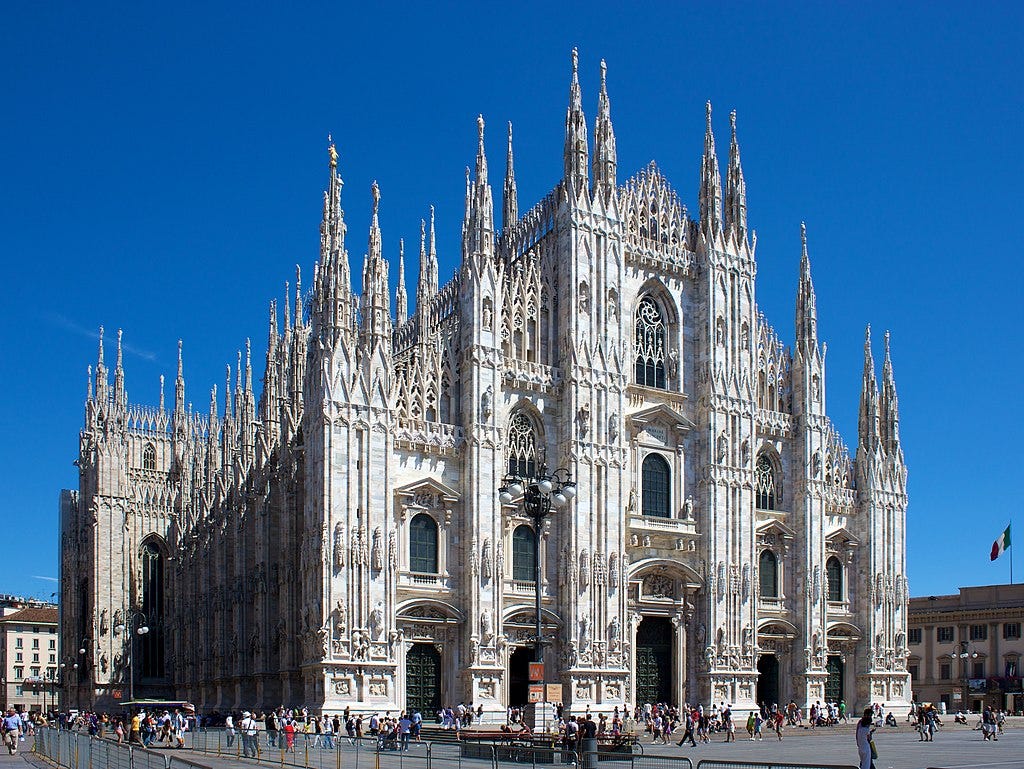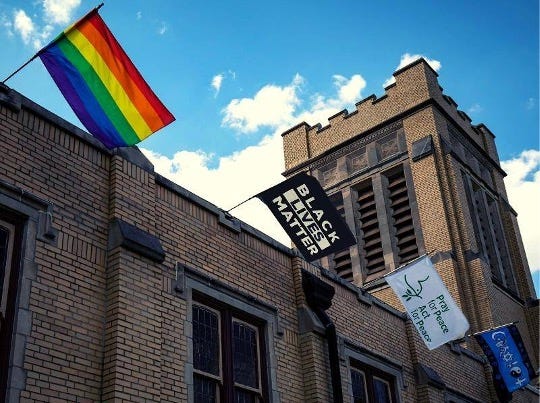
I grew up knowing very little about religion or churches. My father had been raised Catholic and my mother Jewish, but he had long ago left religion behind, and it was never really part of her family’s life; they rarely set foot in a temple.
When we visited my Italian grandparents in the Dolomites, Nonna took my sister and me to church a couple times: once to a Latin mass in the village next to theirs, once to a service at the children’s sanatorium across the street. The first one was a snoozer that felt endless to young kids with no Latin knowledge, and the second was a joke, even for my very religious Nonna. I remember laughing with her when the priest said, “Bisogna fare bene a tua mamma e tuo papà” (“You must do right by your mom and dad”). Some religious service! At least it was memorable.


Some years after these experiences, which didn’t increase my interest in religion, I attended church with my best friend, Mary Grace Williams. We must have been in high school. It was something her family did on Sunday mornings, and I’d slept over at her house, so I went along.
Though she was fine with going, Mary wasn’t much more excited about the outing than I was. Maybe she had more religious leanings than I did, but that wouldn’t have taken much. I certainly don’t recall discussing religion with her, an indication of its lack of prominence in our minds. While we talked at great length about many other topics, our conversations centered around our world of school and friends.
Unlike the Italian masses I’d attended, the service that day at the Community United Church of Christ wasn’t in the least bit memorable. I’m sure God was mentioned in there somewhere, but I don’t recall. Given the very liberal nature of that particular church, other topics may have been covered too. I only know it didn’t feel any more spiritual than my earlier church experiences or elicit feelings of awe or wonder. I’d likely find more of interest in it today — and if I were inclined to join a church, which I’m not, it might be one of this flavor (though I’d more likely gravitate toward something like Sunday Assembly). But at the time, it didn’t grab me. I was eager for the service to end and relieved when it did.

But then, something unexpected happened. As people congregated (sorry!) after the service, the church suddenly came to life. Friends greeted one another, and there was a lot of general milling about. There may have been food and drinks. People lingered.
That was when I had an epiphany that forever changed how I thought about church.
Church, I realized, wasn’t about religion at all! It dawned on me that what had really drawn all these people to come here on a Sunday morning, and to keep coming back on endless Sunday mornings, was something we humans need on a very deep level: community.
Before you get in a tizzy about my blanket declaration, I know that church is in fact about more than just community. It can even be about religion. Every church, not to mention every churchgoer, is different. But because it was all so foreign to me, in that moment all other considerations were overridden by my new awareness: church provides community.
I knew then that by not going to church, I was missing something important in my life.
That was despite the fact that in Urbana, Illinois, where I grew up, we had more community than anywhere I’ve lived since. The university there created a built-in community for those associated with it, as my parents were. The town of 100,000 was small enough that we could drive most places in a few minutes, and when we went to concerts and movies we’d usually run into friends. My alternative high school extended this sense of community by virtue of its small size, and I’m lucky to still have close friends from there.
When I left Urbana, things changed. I once again had some very good luck in finding community in some publishing and tech jobs. I found my people in the writers and editors at those jobs, and some of us are still close. But as friends got older and retreated more into their family lives, those ties became weaker. Community requires regular contact, and we just don’t have that in the same way when we’re not hanging out together every weekday and don’t live in close physical proximity.
It’s a sad reality in modern U.S. culture that workplaces have taken on the burden of providing community. When most of my department at HarperSanFrancisco was laid off in 1997, I felt the sting of losing that community more sharply than the significant financial and career loss. Even if we’re lucky enough to find community at work, we lose it each time we move on from a job.
These days, church isn’t picking up the slack.
I’m not alone in not being a churchgoer; church attendance in the U.S. is declining. While almost 40% of Americans identify as “very religious” according to a 2022 survey, only 20% attend a church or synagogue every week. Other surveys have arrived at similar numbers.
This means that a major source of community is drying up for a lot of us. In the U.S., we also lack the town squares and social culture that would get us associating with more people around us. With most of the population living in large urban areas, we can’t count on small village life to provide community.
Faced with this major loss, how do we find new ways to create community? That’s something I think about a lot — and a question for another post. Or several.
Mary Grace died in 2000. I had never known her to attend church after she left her parents’ home, but when she knew her cancer was terminal, she joined a church in her Boston neighborhood. I was surprised at first, but she told me she’d joined to provide community and support for her husband. I hope he found it there.





I grew up in small-town southern Wisconsin. My hometown, Richland Center, was a dry town at that time with one of the highest ratios of churches to people in the whole state. My mother sent my brothers and me to a non-denominational church, mostly as a way for us to fit in better. We went to Sunday school, and occasionally to church.
None of it really "took," probably because neither of my parents were religious. Today I'm an atheist with a pretty dim view of most organized religion, especially in the U.S.
I "felt" community, at least for a time when I was rather young and attending catholic mass, or rather the remembered coffee and doughnut after-mass get together. And my parents certainly had a close sense of community with other church parishioners for many decades. However, that feeling came at the cost of having to profess supernatural belief, which I could not reconcile after my teen years. And so I had to give up both belief and community.
All that said, it seems that a concept of community has been expressed in popular culture, even if it has become weaker in actual culture. All those Westerns had the town, church, saloon, barber shop, and sometimes a brothel. Congretatin' everywhere, pardner! And those "communities" figured prominently in the story lines. Gone With the Wind showed the Southern concept of community, both the slave holders and the slaves, and how all of that was violently blown away.
And perhaps the "missing" sense of community is a driver of the cultural attacks we now see from nationalist-MAGA-supremacists; they perceive that "their community" is being "diluted" and react with hostility at the perceived loss. That is rather sad, if true. And it suggests that maybe we just need a bigger, better community that includes all humans so we can get beyond how skin color and supernatural belief tend to limit us.